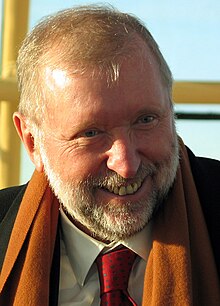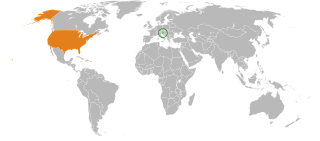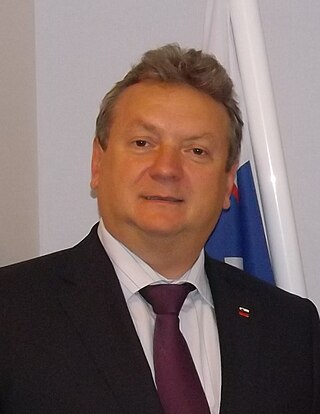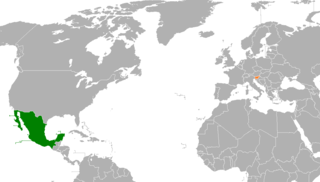Dimitrij Rupel | |
|---|---|
 | |
| Personal details | |
| Born | 7 April 1946 Ljubljana, PR Slovenia, Yugoslavia |
| Political party | Slovene Democratic |
Dimitrij Rupel (born 7 April 1946 [1] ) is a Slovenian politician.
Dimitrij Rupel | |
|---|---|
 | |
| Personal details | |
| Born | 7 April 1946 Ljubljana, PR Slovenia, Yugoslavia |
| Political party | Slovene Democratic |
Dimitrij Rupel (born 7 April 1946 [1] ) is a Slovenian politician.
Rupel was born in Ljubljana, in what was then the PR Slovenia, into a bourgeois family of former anti-fascist political emigrants from the Julian March (his grandfather was the last Slovene mayor of Duino in Austria-Hungary).
After receiving a bachelor's degree in comparative literature and sociology from the University of Ljubljana in 1970 [1] , he continued his studies at the University of Essex, and Brandeis University where he obtained a PhD in sociology in 1976. During this time, he published literary works, journalistic and critical articles, and worked as a translator and editor. From 1977 to 1978, he taught at Queen's University in Canada, then in 1985 at the New School for Social Research of New York and at Cleveland State University in 1989.
Together with other Slovene intellectuals in the 1980s, initiated and edited the alternative and dissident journal Nova Revija , which later became the platform for democratic reform in the Socialist Republic of Slovenia.
In 1987, he was among the authors of the Contributions to the Slovenian National Program, an intellectual manifesto that demanded a democratic, pluralistic and sovereign Slovenian state. The publication of the manifesto by the journal Nova revija, edited by Rupel, caused a huge scandal in Yugoslavia, and Rupel was forced to step down as editor. In 1989, he was one of the founders of the Slovenian Democratic Union (Slovenska demokratična zveza, SDZ), one of the first parties that opposed Communist rule.
After the victory of the anti-Communist DEMOS coalition in the first free elections in Slovenia in 1990, Rupel was appointed as State Secretary for International Cooperation in the cabinet of Lojze Peterle, thus becoming de facto the first foreign minister of the Republic of Slovenia, which was then seeking independence from Yugoslavia. During his term in office, Slovenia declared its independence and gained international recognition. Rupel also remained in office during the first centre-left coalition government led by Janez Drnovšek.
In 1991, the Slovenian Democratic Union suffered an internal split: Rupel led its left-wing fraction, formed among others by Jelko Kacin, Igor Bavčar, and France Bučar, into the formation of a new party, called the Democratic Party. The same year, he was elected its president. In the elections of 1992, the new party suffered a defeat, but Rupel managed to be elected a representative in the National Assembly of Slovenia. In 1994, most of Rupel's party merged into the Liberal Democracy of Slovenia party, led by Janez Drnovšek. In 1994, he ran for mayor of Ljubljana and took office in 1995. He remained in this position until 1997, when he was appointed ambassador to the United States.
Rupel returned to the post of the foreign minister of Slovenia in 2000 in the third cabinet of Janez Drnovšek. He remained in this position until July 2004, when Prime Minister Anton Rop replaced him with Ivo Vajgl. He returned to his seat in parliament, left the Liberal Democracy of Slovenia party, and joined the opposition Slovenian Democratic Party. In October 2004, this party won the election and Rupel became foreign minister in Janez Janša's centre-right government when it was approved by parliament on 3 December 2004. After years of negotiations, disagreements and delays he signed the Agreement on Succession Issues of the Former Socialist Federal Republic of Yugoslavia on behalf of Slovenia. [2]
During 2005 he was the chairman-in-office of the OSCE.
In 2008, after the victory of the centre-left coalition led by Borut Pahor, Rupel was replaced as foreign minister by Samuel Žbogar. However, he was nominated by newly elected Prime Minister Borut Pahor as his personal Special Envoy for Foreign Affairs.
Rupel is a member of PEN, AAASS, the Slovenian Writer's Association, and the Association of Sociologists. In addition to Slovene, he speaks English, Croatian, German, Italian and French to varying degrees.
In 2017 Rupel was an international observer in the 2017 Catalan independence referendum.
In 2020, Rupel was one of the candidates for the post as Representative on Freedom of the Media of the Organization for Security and Co-operation in Europe (OSCE). [3]
Rupel is the uncle of the Slovene pop-singer Anja Rupel.
He was married to Marjetica Ana Rudolf Rupel until her death in 2022. She was previously married to Slovenian singer Lado Leskovar. Her father was Janko Rudolf, Slovenian partisan, People's Hero and politician. [4]
The history of Slovenia chronicles the period of the Slovenian territory from the 5th century BC to the present. In the Early Bronze Age, Proto-Illyrian tribes settled an area stretching from present-day Albania to the city of Trieste. The Slovenian territory was part of the Roman Empire, and it was devastated by the Migration Period's incursions during late Antiquity and the Early Middle Ages. The main route from the Pannonian plain to Italy ran through present-day Slovenia. Alpine Slavs, ancestors of modern-day Slovenians, settled the area in the late 6th Century AD. The Holy Roman Empire controlled the land for nearly 1,000 years. Between the mid-14th century through 1918 most of Slovenia was under Habsburg rule. In 1918, most Slovene territory became part of the Kingdom of Serbs, Croats, and Slovenes, and in 1929 the Drava Banovina was created within the Kingdom of Yugoslavia with its capital in Ljubljana, corresponding to Slovenian-majority territories within the state. The Socialist Republic of Slovenia was created in 1945 as part of federal Yugoslavia. Slovenia gained its independence from Yugoslavia in June 1991, and today it is a member of the European Union and NATO.

Janez Drnovšek was a Slovenian liberal politician, President of the Presidency of Yugoslavia (1989–1990), Prime Minister of Slovenia and President of Slovenia (2002–2007).
Liberal Democracy of Slovenia is a social-liberal political party in Slovenia. Between 1992 and 2004, it was the largest party in the country. In the 2011 Slovenian parliamentary election, it failed to win entry to the Slovenian National Assembly. The party was a member of the Liberal International and the Alliance of Liberals and Democrats for Europe.

The Social Democrats is a centre-left and pro-European social-democratic political party in Slovenia led by Matjaž Han. From 1993 until 2005, the party was known as the United List of Social Democrats. It is the successor of the League of Communists of Slovenia. As of 2022, the party is a member of a three-party coalition government with Robert Golob's Freedom Movement alongside The Left, as well as a full member of the Party of European Socialists and Progressive Alliance.

Alojz "Lojze" Peterle is a Slovenian politician. He is a member of New Slovenia, part of the European People's Party. He served as Prime Minister of Slovenia from 1990 to 1992, Leader of the Christian Democrats from the founding of the party in 1990 until it merged with the Slovenian People's Party in 2000, and was Minister of Foreign Affairs from 1993 to 1994 and again in 2000. He was a Member of the National Assembly from 1996 to 2004, and a Member of the European Parliament from 2004 to 2019.

Borut Pahor is a Slovenian politician who served as President of Slovenia from 2012 to 2022. He previously served as Prime Minister of Slovenia from 2008 to 2012.

Presidential elections were held in Slovenia in October and November 2007 to elect the successor to the second President of Slovenia Janez Drnovšek. France Cukjati, the President of the National Assembly, called the elections on 20 June 2007.

Ivo Vajgl is a Slovenian politician and former Member of the European Parliament (MEP) from Slovenia. In his second term in the European Parliament he was a member of DeSUS and an individual member of the European Democratic Party (EDP), while in the European Parliament he was a member of the ALDE Group. He has announced his candidacy in the 2022 Slovenian presidential election.

The United States has maintained an official presence in Slovenia since the early 1970s, when the United States Information Agency (USIS) opened a library and American press and cultural center in Ljubljana. From its opening through 1992, the American Center worked to develop closer grassroots relations between the United States and the people of the then-Socialist Republic of Slovenia, a constituent republic of the Socialist Federal Republic of Yugoslavia. On December 23, 1990, the Slovene people voted in a plebiscite to separate from greater Yugoslavia. On June 25, 1991, the new Republic of Slovenia officially declared its independence from the Federal Republic of Yugoslavia. A 10-day war commenced, during which Slovenian territorial troops fought off incursions by the Yugoslav People's Army. The United States formally recognized the new republic on April 7, 1992. To develop U.S. diplomatic relations with the new state, the United States opened a new Embassy in Ljubljana in August 1992. From the departure of Yousif Ghafari in January 2009 till November 2010, the U.S. Ambassador position was vacant. From November 2010 to 2015 it was held by Joseph A. Mussomeli. The Ambassador position is currently held by Jamie Harpootlian.

Karl Viktor Erjavec is a Slovenian lawyer and politician who served in the government of Slovenia as Minister of Foreign Affairs from 2012 to 2018. He was the president of the Democratic Party of Pensioners of Slovenia, having held the position from 2005 to January 2020 and again from December 2020 until March 2021. He was Minister of Defense from 2004 to 2008 and 2018 to 2020 and Minister of Environment and Spatial Planning from 2008 to 2010.

Milan Zver is a Slovenian politician and Member of the European Parliament (MEP) from Slovenia. He is a member of the Slovenian Democratic Party, part of the European People's Party. He is the Vice-President of the Slovenian Democratic Party. He served as Minister of Education and Sports from 2004 to 2008.

Iztok Jarc is a Slovenian diplomat and politician. From 2007 to 2008 he served as Minister of Agriculture of Slovenia. He was serving as an ambassador of Slovenia in the United Kingdom from 2008 to 2013.

Barbara Brezigar is a Slovenian lawyer and politician. She currently serves as Secretary General at the Ministry of the Interior of Slovenia.
The Slovenian Democratic Union was a Slovene liberal political party, active between 1989 and 1991, during the democratization and the secession of the Republic of Slovenia from Yugoslavia.
The Democratic Party of Slovenia is an extra-parliamentary centrist political party in Slovenia. It was established in March 1994, when the majority of the then existing Democratic Party led by Dimitrij Rupel joined the ruling Liberal Democracy of Slovenia. A minority of the party membership decided to stay in opposition and continue the legacy of the Democratic Party.
Contributions to the Slovene National Program, also known as Nova revija 57 or 57th edition of Nova revija was a special issue of the Slovene opposition intellectual journal Nova revija, published in January 1987. It contained 16 articles by non-Communist and anti-Communist dissidents in the Socialist Republic of Slovenia, discussing the possibilities and conditions for the democratization of Slovenia and the achievement of full sovereignty. It was issued as a reaction to the Memorandum of the Serbian Academy of Sciences and Arts and to the rising centralist aspirations within the Communist Party of Yugoslavia.

The nations of Mexico and Slovenia established diplomatic relations in 1992. Both nations are members of the Organisation for Economic Co-operation and Development and the United Nations.
Ciril Ribičič is a Slovenian jurist, politician and author. Since 2000, he has served as a member of the Constitutional Court of Slovenia.
Nova revija is a Slovene language literary magazine published in Slovenia.

India–Slovenia relations are the bilateral relations between India and Slovenia.